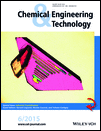Saccharose Inversion and Metastable Zone
Abstract
In the production of beverages, cookies, and candies, citric acid is often used as preservative or flavoring agent. Due to the sensitivity in stability of saccharose concerning pH and temperature, it is necessary to know how these two parameters affect the inversion of sugar and therefore the changes in the characteristics of saccharose crystallization. It can be shown that the inversion speed increases with increasing temperature. Also, the exposure time to the acid as well as the amount of acid lead to an increased inversion and therefore need to be controlled in industrial processes. With a temperature difference of 10 °C, inversion increases by the use of 2.13 % citric acid, e.g., by more than 250 %. The metastable zone shifts, but does not change in its width while inversion takes place and the solubility and nucleation curves are shifted to lower temperatures.




